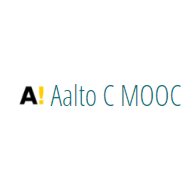| Free C MOOC From Finland |
| Written by Alex Armstrong | |||
| Wednesday, 08 June 2016 | |||
|
A new free open online course to teach the basics of the C programming language has been made available by Aalto University and the University of Helsinki, using the same material as the C programming courses offered on campus. The course must be completed by 31.8.2016, but there are no other deadlines so you may progress at your own pace. To proceed from one module to the next one you must get at least 80% of exercise points of the module.
The modules are: M1 Introduction M2 Pointers M3 Dynamic memory M4 Arrays and bits M5 Advanced features M6 Course summary Online materials, text rather than the videos used by MOOC from Coursera, edX and others, are provided for each module interspersed with programming exercises, which are tested using an automatic testing service. The rationale for this hands-on approach, is pointed out in the Introduction: An important part of the course (and generally, in learning C) is to do small programming exercises that are embedded within this material. The exercises are designed so that if you have read the text from the beginning without jumping around, you should be able to do the exercise with the information you have read until that point. Therefore, when you encounter an exercise, you could stop reading and try to do the exercise. Prior to embarking on the course you'll need to create an account on the TestMyCode server and set up a programming environment. Netbeans is the suggested one as it saves you having to install anything on your own machine but using the command line tools and a separate editor is also supported. The introduction also points out that the course has a limited aim: This material is not intended as a complete reference about C, but just aims to contain sufficient information to get started with C programming. For additional and more complete information, it is recommended that you get a book that contains additional details about various aspects. A very commonly used reference is "The C Programming Language" by Brian W. Kernighan and Dennis M. Ritchie (currently at its 2nd edition). In this material we typically refer to this book by just as "the K&R book".
Although this is an introductory course in C it isn't suitable as a first programming course for the complete beginner as it assumes some general programming knowledge. A quick look at the course materials reveals it takes the traditional, bottom-up approach to learning C. Early in the first introductory module the student gets introduced to date types and variables in a way that - int, short int, long long int - and to uint32_t, int32_t, which are described in bit-width terms rather than numeric ranges. The C course is the fourth MOOC in English from the University of Helsinki - the others are: Object-Oriented Programming with Java, part I Object-Oriented Programming with Java, part II Functional programming with Clojure The first Java course, which is also 6 weeks in length, is a course for those with no prior programming knowledge. It introduces all the basics of computer programming, algorithms and object-oriented programming using the Java programming language, also using the TestMyCode server, and is recommended as a course to complete before the C course for beginners.
More InformationRelated ArticlesFree Code Camp - Not Just A Bootcamp To be informed about new articles on I Programmer, sign up for our weekly newsletter,subscribe to the RSS feed and follow us on, Twitter, Facebook, Google+ or Linkedin.
Comments
or email your comment to: comments@i-programmer.info |
|||
| Last Updated ( Wednesday, 08 June 2016 ) |



